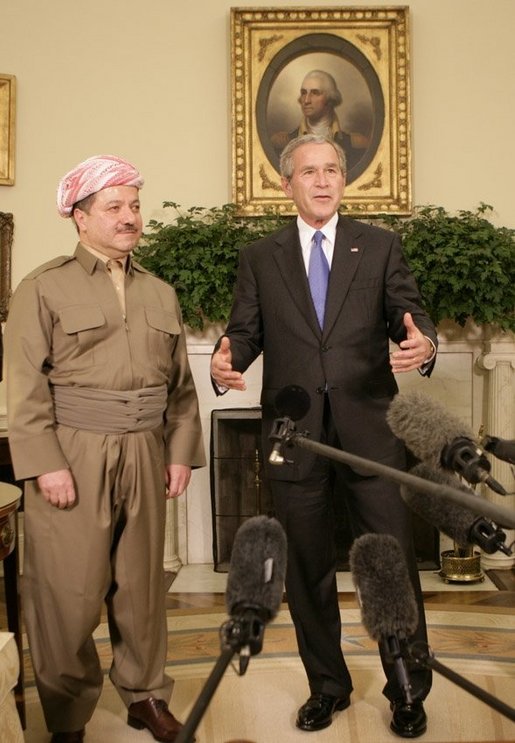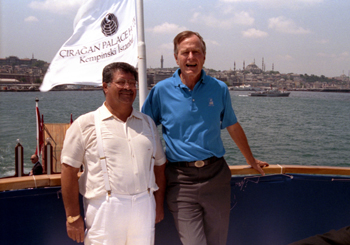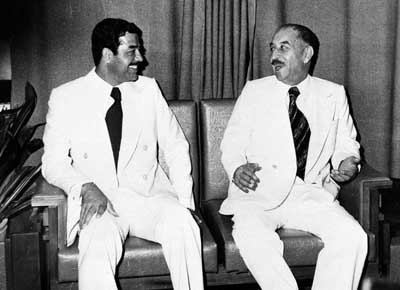|
Massoud Barzani
Masoud Barzani (; born 16 August 1946) is a Kurdish politician who has been leader of the Kurdistan Democratic Party (KDP) since 1979, and was President of the Kurdistan Region of Iraq from 2005 to 2017. Early life and career Barzani was born in Mahabad, Iran, and succeeded his father Mustafa Barzani as leader of the KDP in 1979. Working closely with his brother Idris Barzani until Idris's death, Barzani and various other Kurdish groups fought with Iran against the Iraqi military during the Iran–Iraq War. Barzani has played a key role in the development of the Kurdistan Region polity since the Gulf War. President of Kurdistan Region A major result of Saddam Hussein's defeat in the Gulf War (1991) and Operation Provide Comfort was the ultimate establishment of Kurdish control over northern Iraq in 1992, he was given a Turkish passport by the then-president Turgut Özal in order to help Barzani travel freely. Just a few months after the creation of the autonomous zon ... [...More Info...] [...Related Items...] OR: [Wikipedia] [Google] [Baidu] |
President Of Kurdistan Region
The president of Kurdistan Region is the head of semi-autonomous Kurdistan Region in northern Iraq. They are part of the Kurdistan Presidency Council. The current president of Kurdistan Region is Nechirvan Barzani, who assumed office on 10 June 2019. List of presidents 1992–2005 After the 1992 parliamentary election resulted in the two main parties, the Kurdistan Democratic Party (KDP) and the Patriotic Union of Kurdistan (PUK), each holding 50 out of 100 seats, they decided to create a unity government (which was not recognized by the Ba'athist Iraq, led by Saddam Hussein).Galbraith, Peter (2006), ''The End of Iraq: How American Incompetence Created a War without End''; Simon and Schuster. The unity government soon collapsed and in 1994 a civil war broke out, which lasted until 1998. This resulted in the establishment of two Kurdistan Regional Governments in 1996, a KDP-controlled one in Erbil and a PUK-controlled one in Sulaymaniyah, each with their own president. 20 ... [...More Info...] [...Related Items...] OR: [Wikipedia] [Google] [Baidu] |
Mahabad County
Mahabad County () is in West Azerbaijan province, Iran. Its capital is the city of Mahabad Mahabad () is a city in the Central District of Mahabad County, West Azerbaijan province, Iran, serving as capital of both the county and the district. Etymology Mahabad first became the name of the city after World War I, during the .... History After the 2006 National Census, the village of Khalifan was elevated to the status of a city. Demographics Population At the time of the 2006 census, the county's population was 197,441 in 42,493 households. The following census in 2011 counted 215,529 people in 53,563 households. The 2016 census measured the population of the county as 236,849 in 65,562 households. Administrative divisions Mahabad County's population history and administrative structure over three consecutive censuses are shown in the following table. Geography The climate is mountainous with cold winters and temperate summers. Mahabad river flows throu ... [...More Info...] [...Related Items...] OR: [Wikipedia] [Google] [Baidu] |
1992 Kurdistan Region Parliamentary Election
General elections were held in the Kurdistan Region of Iraq on 19 May 1992 to elect the president and the 105 members of the Kurdistan National Assembly. The elections had initially been planned for 16 May, but were delayed due to concerns about ink delibility leading to voter fraud. In the first round of the presidential election Kurdistan Democratic Party (KDP) leader Massoud Barzani received slightly more votes than his main rival Jalal Talabani, the leader of the Patriotic Union of Kurdistan (PUK). With neither receiving a majority of the vote,The 2009 Kurdish Elections , July 23, 2009 a second round was due to held. However, due to both leaders fearing they may lose in a run-off, the second round was never held and the |
Turgut Özal
Halil Turgut Özal (13 October 192717 April 1993) was a Turkish politician, bureaucrat, engineer and statesman who served as the eighth president of Turkey from 1989 to 1993. He previously served as the 26th prime minister of Turkey from 1983 to 1989 as the leader of the Motherland Party. He was the deputy prime minister of Turkey in the military government of Bülend Ulusu between 1980 and 1982. After working briefly at the World Bank in the United States and as a university lecturer, Özal became the general secretary and later the leader of the main miners' trade union of Turkey in 1979, serving as a chief negotiator during large-scale industrial action in 1977. He unsuccessfully stood for Parliament in the 1977 general election as a National Salvation Party (MSP) candidate from İzmir. In 1979, he became an undersecretary to Prime Minister Süleyman Demirel's minority government until the 1980 military coup. As an undersecretary, he played a major role in developing e ... [...More Info...] [...Related Items...] OR: [Wikipedia] [Google] [Baidu] |
Turkish Passport
Turkish passport () are issued to Turkish citizens for travel outside Turkey as per the Passport Act dated July 15, 1950. Citizens of the ''de facto'' state of the Turkish Republic of Northern Cyprus are also eligible to apply for a Turkish passport. Passports issued since 1 June 2010 are biometric and valid for up to 10 years. Turkey is the only EU candidate country whose citizens are still required visas for their travels to the European Union member countries. Types *Ordinary passport (), also referred to as the Maroon Passport (). It is issued to Turkish citizens who don't qualify for any of the following passport types. *Special passport (), also referred to as the Green Passport (), allows the bearer to travel visa-free to European countries (except the UK and Ireland), some 67 countries, including but not limited to Ivory Coast, China, the Philippines. As opposed to the regular passport, it is exempt from the passport fee and is only subject to the booklet fee (₺1135) ... [...More Info...] [...Related Items...] OR: [Wikipedia] [Google] [Baidu] |
Operation Provide Comfort
Operation Provide Comfort and Provide Comfort II were military operations initiated by the United States and other Coalition nations of the Persian Gulf War, starting in April 1991, to defend Kurdish refugees fleeing their homes in northern Iraq in the aftermath of the Gulf War, and to deliver humanitarian aid to them. The no-fly zone instituted to help bring this about would become one of the main factors allowing the development of the autonomous Kurdistan Region. Summary Operation Haven (the UK's name for the operation) was a UK-headed initiative, made at a time when the US was fundamentally uninterested in any further taking of action in the Persian Gulf region. John Major, the British prime minister at the time, lobbied for other European states to support the mission, which resulted in NATO's support and leveraged the necessary US air support. Then, as Saddam Hussein's retributive activities intensified, US ground and logistic support was also achieved. This was a ... [...More Info...] [...Related Items...] OR: [Wikipedia] [Google] [Baidu] |
Saddam Hussein
Saddam Hussein (28 April 1937 – 30 December 2006) was an Iraqi politician and revolutionary who served as the fifth president of Iraq from 1979 until Saddam Hussein statue destruction, his overthrow in 2003 during the 2003 invasion of Iraq, U.S. invasion of Iraq. He previously served as the Vice President of Iraq, vice president from 1968 to 1979 and also as the prime minister of Iraq, prime minister from 1979 to 1991 and later from 1994 to 2003. A leading member of the Ba'ath Party, Arab Socialist Ba'ath Party, he espoused Ba'athism, a mix of Arab nationalism and Arab socialism, while the policies and political ideas he championed are collectively known as Saddamism. Born near the city of Tikrit to a Sunni Islam, Sunni Arabs, Arab family, Saddam joined the revolutionary Ba'ath Party in 1957. He played a key role in the 17 July Revolution that brought the Ba'athists to power and made him Vice President of Iraq, vice president under Ahmed Hassan al-Bakr. During his tenure ... [...More Info...] [...Related Items...] OR: [Wikipedia] [Google] [Baidu] |
Massoud Barzani & Abd Al-Karim Qasim
Massoud (, ) is a given name and a surname, commonly found in the Middle East and Asia. It has a variety of spellings including Masoud, Masud, Massoude, Massudeh, Masood, Masʽud, Masud, Mashud, Messaoud, Mesut, Mesud, or Mosād. People with the name Massoud include: People with the given name Massoud * Massoud Abdelhafid, Libyan retired army general * Massoud Achkar (1956–2021), Lebanese politician * Massoud Amin (born 1961), American professor of engineering * Massoud Behnoud, Iranian journalist * Massoud Borazani, 1st president of Iraqi Kurdistan * Massoud Fouladi, Iranian-born ophthalmologist * Massoud Hamid, Kurdish Syrian photographer * Massoud Hossaini (born 1981), Afghan-born photojournalist * Massoud Keshmiri, Iranian militant and undercover politician * Massoud Khalili (born 1950), Afghan diplomat * Massoud Nawabi (1954–2010), Afghan poet/writer * Massoud Pedram, Iranian American computer engineer * Massoud Rajavi, Iranian militant politician * Massoud ... [...More Info...] [...Related Items...] OR: [Wikipedia] [Google] [Baidu] |
Gulf War
, combatant2 = , commander1 = , commander2 = , strength1 = Over 950,000 soldiers3,113 tanks1,800 aircraft2,200 artillery systems , page = https://www.govinfo.gov/content/pkg/GAOREPORTS-PEMD-96-10/pdf/GAOREPORTS-PEMD-96-10.pdf , strength2 = 1,000,000+ soldiers (~600,000 in Kuwait)5,500 tanks700+ aircraft3,000 artillery systems , casualties1 = Total:13,488 Coalition:292 killed (147 killed by enemy action, 145 non-hostile deaths)776 wounded (467 wounded in action)31 tanks destroyed/disabled28 Bradley IFVs destroyed/damaged1 M113 APC destroyed2 British Warrior APCs destroyed1 artillery piece destroyed75 aircraft destroyedKuwait:420 killed 12,000 captured ≈200 tanks destroyed/captured 850+ other armored vehicles destroyed/captured 57 aircraft lost 8 aircraft captured (Mirage F1s) 17 ships sunk, 6 captured. Acig.org. Retrieved on 12 June 2011 , casualties2 = Total:175,000–300,000+ Iraqi:20,000–50,000 killed ... [...More Info...] [...Related Items...] OR: [Wikipedia] [Google] [Baidu] |
Polity
A polity is a group of people with a collective identity, who are organized by some form of political Institutionalisation, institutionalized social relations, and have a capacity to mobilize resources. A polity can be any group of people organized for governance, such as the board of a corporation, the government of a country, or the government of a country subdivision. A polity may have various forms, such as a republic administered by an elected representative, the realm of a hereditary monarch, and others. The preeminent polities today are Westphalian sovereignty, Westphalian states and nation-states, commonly referred to as countries. Overview In geopolitics, a polity can manifest in different forms such as a State (polity), state, an empire, an international organization, a political organization or another identifiable, resource-manipulating organizational structure. A polity like a state does not need to be a Sovereignty, sovereign unit. The preeminent polities tod ... [...More Info...] [...Related Items...] OR: [Wikipedia] [Google] [Baidu] |
Iran–Iraq War
The Iran–Iraq War, also known as the First Gulf War, was an armed conflict between Iran and Iraq that lasted from September 1980 to August 1988. Active hostilities began with the Iraqi invasion of Iran and lasted for nearly eight years, until the acceptance of United Nations Security Council Resolution 598 by both sides. Iraq's primary rationale for the attack against Iran cited the need to prevent Ruhollah Khomeini—who had spearheaded the Iranian revolution in 1979—from exporting the new Iranian ideology to Iraq. There were also fears among the Iraqi leadership of Saddam Hussein that Iran, a theocratic state with a population predominantly composed of Shia Muslims, would exploit sectarian tensions in Iraq by rallying Iraq's Shia majority against the Baʽathist government, which was officially secular but dominated by Sunni Muslims. Iraq also wished to replace Iran as the power player in the Persian Gulf, which was not seen as an achievable objective prior to the Is ... [...More Info...] [...Related Items...] OR: [Wikipedia] [Google] [Baidu] |
Iraqi Military
The Iraqi Armed Forces are the military forces of the Republic of Iraq. They consist of the Ground forces, the Army Aviation Command, the Iraqi Air Force, the Air Defence Command, and the Iraqi Navy. The armed forces are administered by the Ministry of Defence (MoD). Effective control of the MOD armed forces rests with the Prime Minister of Iraq. Along with the primary service branches, there exists two non-MOD agencies that are part of the armed forces and report directly to the Prime Minister; namely, the Iraqi Counter Terrorism Service and the Popular Mobilization Committee. The armed forces of Iraq were initially formed in the early 1920s. Six military coup d'états were mounted by the army between 1936 and 1941. They first saw combat in the Anglo-Iraqi War of 1941. They fought against Israel in the 1948 Arab–Israeli War, in the 1967 Six-Day War, and in the 1973 Yom Kippur War. Two wars against the Kurds were fought during 1961-1970 and 1974–1975. A much larger c ... [...More Info...] [...Related Items...] OR: [Wikipedia] [Google] [Baidu] |








